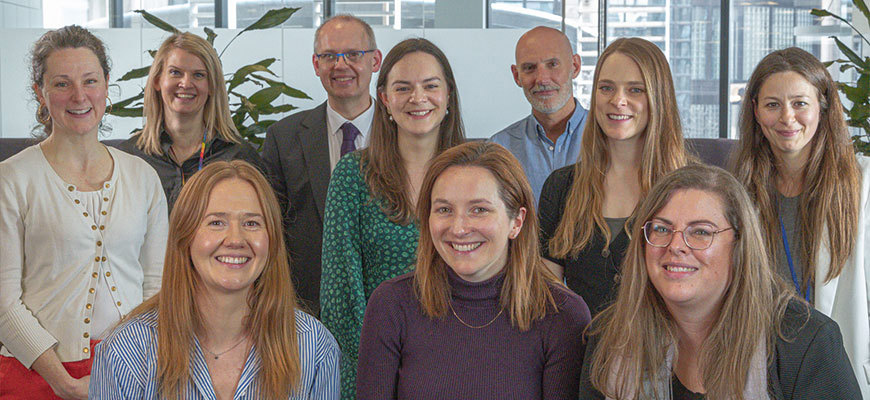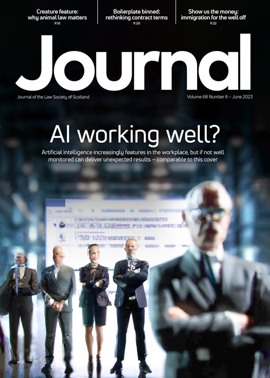Profile: Paul Gostelow

 Tell us about your career so far?
Tell us about your career so far?
Growing up, I had no ambition to be a solicitor. Apart from what I saw on TV, I didn’t know what was involved in being a solicitor. I didn’t know any solicitors. More by luck than design, the law and I just bumped into each other. I’m really glad we did.
I began my career in Edinburgh, initially in a firm doing Court of Session defender personal injury work, followed by a stint doing criminal defence work. I learned a lot and got to be part of a totally different world from the one I grew up in, but in my heart, I wanted to work in law centres, which I relocated to the west to do in the late mid-90s. It was a privilege to do so, and again I learned a lot about a world with which I thought I was familiar.
From there, I worked on my own through the early part of this century, being a Jack of all high street legal services. Since 2008 I’ve worked in South Lanarkshire with my wife, Gillian, with my practice mainly distilling down to family law and guardianship. I also became accredited as a family law mediator.
I served my local faculty, which led me to the Law Society of Scotland’s Council. Again, the Society was a world with which I was unfamiliar, but I feel a sense of commonality with solicitors wherever and however we practise.
Now, coming up for 30 years as a solicitor, it remains humbling and a privilege to help people going through bad times, and the good news is there’s still a lot to learn, which comes in handy for the Sustainability Committee.
What made you want to be a part of the Sustainability Committee?
That is a big question with an even bigger answer but, fundamentally, it’s the opportunity to help shape change.
Denial is dangerous. Dealing with climate change is the core issue of our times. We experience its palpable impacts as our planet responds to the damage we continue to do to it. The growing impacts of climate change are fast-paced and already easily overtake our existing initiatives to tackle them. They collapse the normal boundaries between private and professional life, or large and small organisations. We will all be impacted by the enormous implications of climate change, including for equality, wellbeing, the economy, and the rule of law.
Tackling climate change demands a robust approach, to redefine how we organise our lives to mitigate the worst impacts. The IPCC, Paris Agreement, COP Conferences, UK and Scottish legislation highlight that the need to adapt to this change is inevitable with leadership at all levels of society imperative. The reality is solutions will come from every level of society, including the legal sector.
As much as it’s daunting, we already know the solutions which will allow us to mitigate, if not halt the damage we are doing to the planet and as a result to ourselves. A starting point is acknowledgement.
The Sustainability Committee is a new addition to the Society. What do you think this will mean for the profession?
There’s no way back to a way of living our lives or ordering society in the manner we do, without recognising that it comes with a cost that can’t be borne by the planet any more. We must adapt to this new reality by changing. Sustainability is the organising paradigm that allows us to do so.
We already know that the legal sector’s sustainability credentials matter to clients, including lenders. How we contribute to the creation of a sustainable future is also increasingly important to young people considering entering the profession. The Sustainability Committee offers our members the opportunity to engage, participate, influence, contribute and articulate what we need to do to tackle climate change. The work we will undertake will equip our members with the help, information and resources to adopt the necessary sustainable changes to our lives and businesses.
The committee is already creating an environment in which we are engaging both nationally and internationally with other law societies around what we can all do to address the impacts of climate change. However, as a committee, it is also crucial that we turn up the volume to cultivate an environment in which all our members find ways to adapt to more sustainable alternatives appropriate to their circumstances.
Tackling sustainability may seem more accessible to larger firms. What would you say to high street solicitors like yourself, when thinking about these issues?
My gut is that this dichotomy is more apparent than real. It is to the credit of larger legal practices that many are implementing sustainability measures, which is both an authentic attempt to tackle climate change and something that is an increasing expectation of their client base. However, a changing climate will impact us all irrespective of where we are situated in the Scottish legal sector. Concerns and anxiety about the impacts of climate change are likely to be experienced by individuals in every sector of the legal profession. In smaller practices, the most likely hurdle is not knowing what to do to help tackle the problem, not a disinterest in tackling it.
Every individual and organisation, large and small, can contribute to becoming more sustainable. The Sustainability Committee will help all our members to do so, and that is likely to lead to more engagement with smaller practices. In doing so the committee recognises there is no one size fits all approach to becoming more sustainable.
This is after all a crucial function to members. Smaller practice units make up a high percentage of our legal sector. They are situated in communities which may well bear the initial brunt of the impacts of climate change. Smaller practices will provide the advice and help that communities need as we adapt to the changing climate. Adapting to change is not only in how we organise ourselves but in building capacity among our members to continue to provide help to their clients and communities.
Could you give the readers an idea of the aims of the committee and the plan for the next year?
The committee is currently drafting a climate change resolution; working to build a resources hub to help members access information about what they can do to become more sustainable; developing CPD to focus all our minds on developing and delivering a sustainability agenda for the profession; and working with the Society to help develop sustainability goals as a key measure of its operations.
Finally, what keeps you busy outside of work?
Wondering why I invested in a tennis racket with strings when the ball just hits the racket head, and whether my knees can handle another game of football. In between my sport angst, I’m also a volunteer with my local Community Fridge.
Perspectives
Features
Briefings
- Criminal court: Dangerous or careless?
- Corporate: Bill gives CMA consumer enforcement powers
- Agriculture: A question for the Land Court?
- Intellectual property: Who owns AI generated copyright?
- Succession: Variation by an attorney?
- Sport: Participation in LIV Golf ruled out of bounds
- Scottish Solicitors' Discipline Tribunal: June 2023
- Data protection: Meta's mega matter
- In-house: Scanning wider horizons






